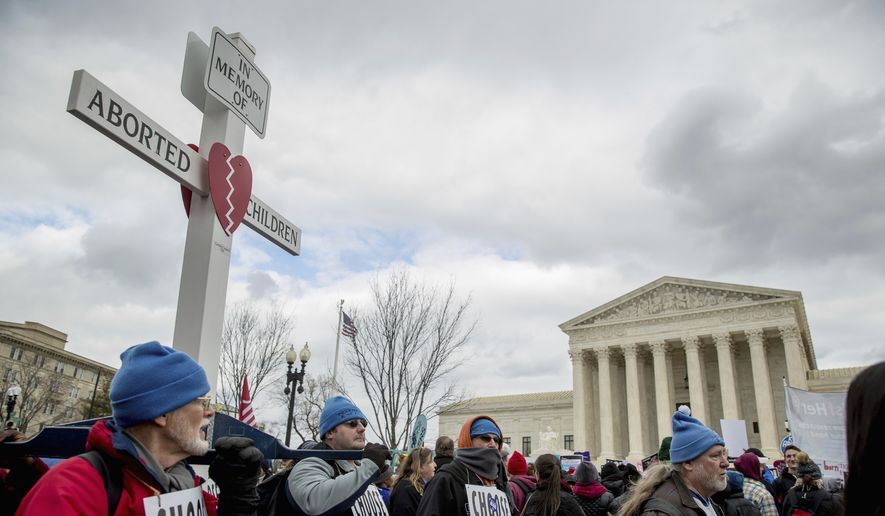Pro-life activists say a federal judiciary freshly stocked with Trump appointees presents the best legal landscape in decades to overturn Roe v. Wade, the 1973 U.S. Supreme Court ruling that created a constitutional right to abortion.
With renewed confidence in the courts, Republican-led states are pushing the envelope on abortion restrictions. Take Ohio, where legislation to protect life from the moment of conception was introduced last month.
Barry Sheets, legislative consultant for the Right to Life Action Coalition of Ohio, said the prospect of challenging Roe “factors into every piece of legislation we’re working on.”
“I think it definitely will be a challenge to Roe,” Mr. Sheets said. “The bill says for the purposes of Ohio law, abortion shall not be legal in any way, shape or form. I think that naturally sets up a challenge for Roe. The way we look at it, we have to give the court something to look at.”
The pro-choice Guttmacher Institute said 19 states enacted 63 abortion restrictions last year, the most since 2013.
The trend shows no signs of slowing this year.
In February, the Iowa Senate approved a bill that would ban abortion as early as six weeks of gestation. In Mississippi last month, Republican Gov. Phil Bryant, a Republican, signed a 15-week abortion ban into law.
In Missouri last week, the state House gave initial approval to legislation that would ban abortion at 20 weeks of gestation.
Pro-choice groups have met legislation with litigation.
Jackson Women’s Health Organization, Mississippi’s last remaining abortion clinic, sued to prevent the 15-week abortion ban from taking effect. On March 19, U.S. District Judge Carlton W. Reeves, an appointee of President Obama, granted a temporary restraining order.
Kaylie Hanson Long, national communications director for NARAL Pro-Choice America, said the Mississippi law is “blatantly unconstitutional.”
“The ban is clearly an attempt to effectively bring the state one step closer to outlawing abortion entirely,” Ms. Long said in a statement.
Ohio’s abortion ban is a naked attempt to topple Roe v. Wade, said Kellie Copeland, executive director of NARAL Pro-Choice Ohio.
“What we’re seeing today is the culmination of 45 years of maneuvering from anti-choice forces,” Ms. Copeland said in a statement. “What we do in this election and this legislative session could well determine the fate of Roe v. Wade for generations to come.”
Dana Chisholm, president of Pro-Life Mississippi, sees things differently. Although she favors the repeal of Roe, she attributes the flurry of pro-life legislation at the state level to dissatisfaction with modest pro-life gains made by Congress.
“I would love to overturn Roe v. Wade, but I don’t think this is a steppingstone toward that,” Ms. Chisholm said of the 15-week abortion ban. “The states have been left alone to do what they can, and I am proud that in Mississippi, we have tried.”
A serious legal challenge to Roe v. Wade is contingent on several factors, said Clarke Forsythe, senior counsel for the pro-life litigation firm Americans United for Life.
“Certainly one is the membership of the court,” Mr. Forsythe said. “This court isn’t going to overturn Roe. There would have to be some transition or change in membership. It’s going to take time, and it’s going to take turnover.”
The rumored retirement of Justice Anthony M. Kennedy, 81, would give President Trump the chance to nominate another jurist in favor of overturning the 1973 decision. Justice Neil M. Gorsuch, 50, who was confirmed to the Supreme Court one year ago, is widely seen as a vote against Roe.
Justice Clarence Thomas is the only jurist who has voted to repeal Roe while on the highest court. He is the sole dissenting vote remaining from Planned Parenthood of Southeastern Pennsylvania v. Casey, the 1992 decision co-authored by Justice Kennedy reaffirming Roe.
At issue in Casey was not an abortion ban, but several regulations including spousal and parental notification requirements.
The Supreme Court can use “any case it wants” to review Roe, Mr. Forsythe said, not just those banning abortion at earlier stages of pregnancy.
“The justices will ultimately decide,” Mr. Forsythe said. “Meaning, they’ll not only decide whether Roe v. Wade survives or is overturned, but they’ll decide whether to hear the case, because they have complete discretion. They will ultimately decide the timing.”
Mr. Sheets, the Ohio pro-life activist, said the composition of the Supreme Court could shift radically by the end of Mr. Trump’s first term.
“We’re optimistic, with one solid appointment to the Supreme Court, and the possibility to have one, two or maybe three more appointments between now and the end of 2020,” he said. “Then the only question is how fast we can get that challenge up to the Supreme Court.”
• Bradford Richardson can be reached at brichardson@washingtontimes.com.




Please read our comment policy before commenting.